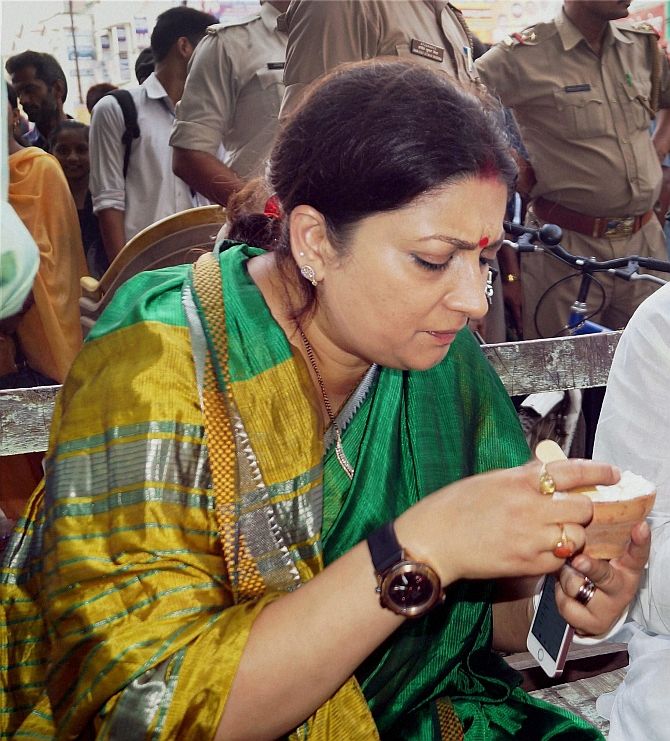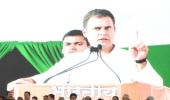'One hopes that in his second term, Modi spends more time reading serious material even if it bores him or is against his nature,' says Aakar Patel.

How educated does a leader have to be and what is the consequence of a lack of intellectual exposure?
The Congress is making fun of the fact that Smriti Irani did not go to college. She joined a correspondence course but did not finish it, which probably means she had no interest in furthering her education.
Irani is a smart and clever individual and her lack of formal education does not appear to have hindered her progress, though one can judge her quality only from her policy interventions which not many of us have any idea about.
There is no shame in not having gone to college, but Irani got into trouble because she had made some claims about her education (having gone to Yale University) which were misleading if not outright false.
It should be said that the Congress party's dynasty is itself not particularly qualified in the educational sense. Rajiv Gandhi went to England to study at Cambridge but he failed his exams and did not get a degree.
His brother Sanjay did not even pass out of high school. He left school to take up a course in automobile repairs. It is shocking that such a person was so powerful and allowed a big say in policy by his mother.
Sanjay's wife Maneka married him when she was 18 and therefore does not have a proper education. Her Lok Sabha qualification says she only went to school.
Sonia Gandhi did not go to college either. Her studies ended at the age of 18, and she also married early. Indira Gandhi did not get a degree either.
Rahul Gandhi is called 'Pappu' by his detractors, but he seems to be academically bright. He has a master's in philosophy in development economics from Trinity College, Cambridge.
This is the same place that Nehru also studied. It may interest readers to know that Nehru passed with a third class and was not a good student.
Rahul is the most educated individual in the Gandhi family's history.
The most famous British prime minister Winston Churchill did not go to college and did not have a formal education. This is remarkable because he was a historian and a novelist and won the Nobel Prize for Literature in 1953.
Another British prime minister who left school at 16 and did not go to college was John Major, whom older readers will remember as Margaret Thatcher's successor. A total of 11 British PMs have not been to college.
Narendra Damodardas Modi left his house and his wife at the age of 17 and therefore did not go to college. He did a correspondence course though there is some controversy over the authenticity of the documents he has produced.
Despite his lack of formal education, we can observe that he is a good politician. However, I think he has one crucial flaw. He does not engage deeply with policy material like Manmohan or Obama or someone intellectual might.
In one of his interviews, Modi has himself described how he works. He says: 'Three or four days after I became chief minister of Gujarat, the chief secretary came to me. He brought a heap of files this tall (gesturing about three feet high). They must have weighed 15 or 20 kilos. The peon left them on my table.'
'The chief secretary sat and said to me: "This is the file for Narmada". I can remember Narmada, but there were three other files also. The CS said: "These are on Gujarat's vital and sensitive issues. Take the time out to read them. You may need to speak on, and take a position on, at any time and address all these issues".'
'I kept looking up and down the height of the stack three or four times. I said to him: "You leave these here and we shall meet in a few days".'
'I did not even open these files. They stayed where they were. A voice came to me that I could not work through academics study (sic). I can't do that. That voice came from within. I said to the three officers who were working with me that "the CS has given these to me. I will not be able to read so much. First, you people make me understand what masala (sic) the files contain".'
'"If I begin reading all this material, there's no end to it. It is not in my nature (prakruti<) to read files".'
'Three or four days later, the CS returned. I said to him: "Tell me what the important things are in these files." He did so and I said: "This much is sufficient for me, you can take the files back".'
'After that I have never had to be briefed on these issues, and it has been 13 years since.'
'I had such ability that I was able to grasp the granularity of the issues. Such things left an impact on the officers. I don't argue. I am a good listener. Don't go by my reputation outside: I listen a lot. I can say today that if in my development reading played a 30 per cent role then listening had a 70 per cent role.'
'What I hear, I analyse, and classify the 'maal' (sic) in different boxes in my mind. This takes me no time and when needed I can retrieve it. This extra method (vidha) I have been able to develop.'
'Even today if my officers show me some paper, I say: "Tell me what's in it in two minutes." For me two minutes is sufficient for a 10-page document. This skill is something I have developed.'
Unfortunately, this is not appropriate for running a large and complex nation. One hopes that in his second term, Modi spends more time reading serious material even if it bores him or is against his nature.
Aakar Patel -- winner of the 2018 Prem Bhatia Award for Political Reporting -- is Executive Director, Amnesty International India. The views expressed here are his own.
- You can read Aakar's earlier columns here.










